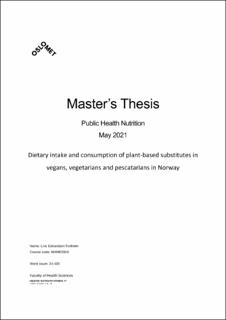| dc.description.abstract | Background: The number of people choosing to eat a plant-based diet is rapidly increasing. At the same time, the market for plant-based meat and dairy substitutes is growing fast.
Objective: The main objective in this study was to assess the total dietary intake and the intake of plant-based meat and dairy substitutes in vegan, vegetarian and pescatarian diets in Norway.
Method: 24-hour recall was used to assess the total dietary intake of macro- and micronutrients, including supplements, and the intake of plant-based substitutes in a sample of 158 participants (83 vegans, 47 vegetarians and 28 pescatarians). Food intake was registered meticulously and nutrient content calculated in FoodCalc.
Results and conclusion: The main findings indicate that vegans, vegetarians and pescatarians in Norway have beneficial macronutrient intake, with median energy percentages within the levels of the Nordic Nutrition Recommendations. In addition, the overall median intake of most micronutrients met the average requirement. However, the proportion of participants meeting the average requirements was low for iodine (55 %), vitamin D (57 %) and selenium (58 %), suggesting a risk of inadequate intake of these micronutrients in plant-based diets. Use of supplements were reported by 68 % of the participants, and supplements was the single main source of vitamins D and B, iron, zinc, selenium and iodine. The results indicated high intake of plant-based substitutes in the group, as intake of meat- and dairy substitutes were reported by 44 % and 68 % of the participants respectively. Most meat substitutes reported, were based on soy, and most dairy substitutes based on oats or soy. Dietary practice was a predictor of both meat- and dairy substitutes, and vegans had significantly higher odds than pescatarians. In addition, health motivated dietary practice and animal welfare motivated dietary practice were strong predictors of dairy substitute intake. | en_US |
